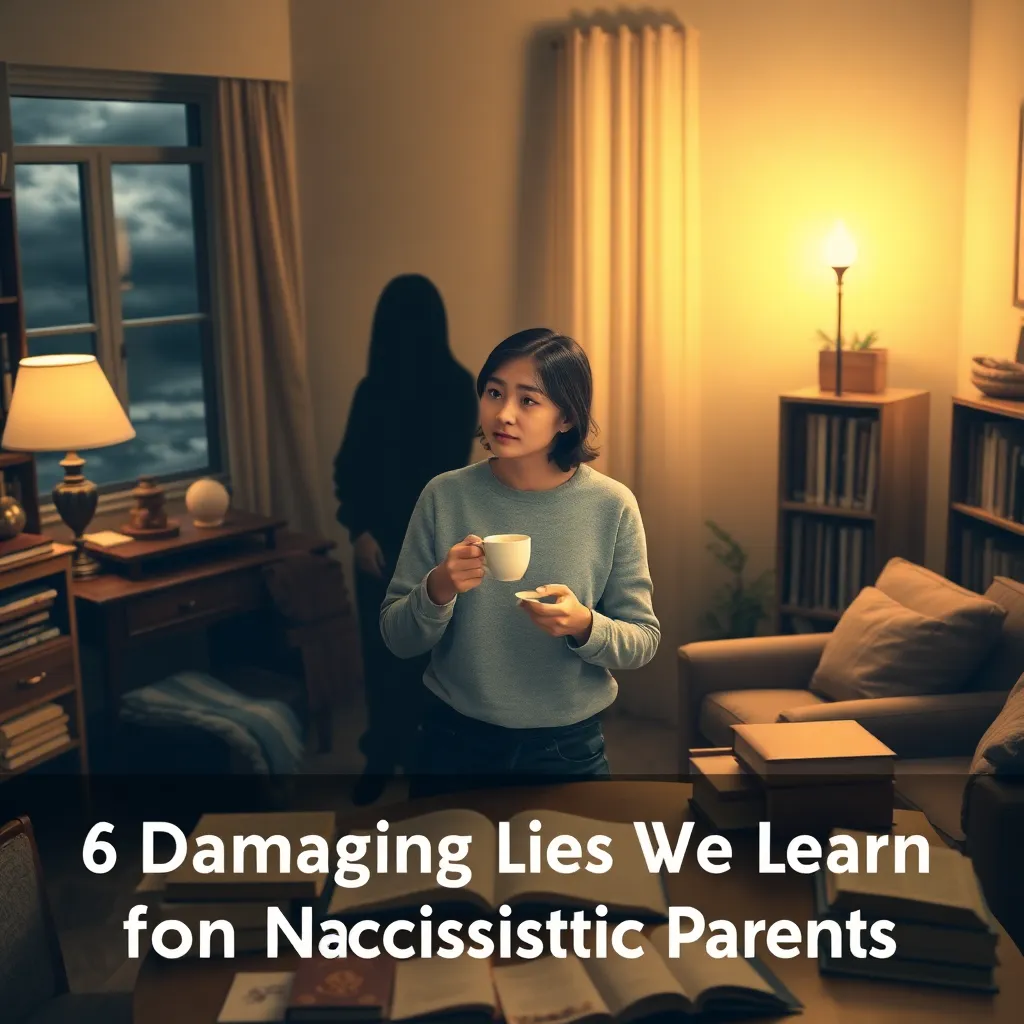Growing up with narcissistic parents can be a challenging experience that leaves lasting impressions on how we perceive ourselves and our relationships. If you ever find yourself questioning your self-worth or wondering why certain patterns repeat in your life, it’s important to know you’re not alone, and understanding these dynamics is the first step towards healing.
The impact of these early experiences can be profound, shaping our beliefs and behaviors in ways we might not even realize. By exploring the specific lies often imparted by narcissistic parents, we can begin to unravel the emotional knots that bind us and reclaim our sense of self.
In this article, we’ll delve into six damaging lies that many children of narcissistic parents have internalized, and how these falsehoods might be influencing your current relationships. Our goal is to provide insight and practical strategies to help you break free from these limiting beliefs and foster healthier, more fulfilling connections.
1. Self-Worth Tied to Approval

Growing up with narcissistic parents often means learning that your self-worth is intricately tied to their approval. This belief can lead to a constant chase for validation in your adult relationships, leaving you feeling incomplete without external affirmation.
Imagine a scenario where your partner offers genuine praise, but you dismiss it because it doesn’t match the validation you were conditioned to seek. This pattern can create unnecessary tension, as you’re unable to fully embrace the love and acceptance being offered.
Breaking this cycle requires a shift in how you perceive your own value. Begin by recognizing your intrinsic worth, independent of anyone else’s opinions or approval.
Experts suggest engaging in self-reflection and self-care practices to reinforce a positive self-image. Over time, you can cultivate a sense of self-worth that is resilient and internally grounded, fostering healthier relationships.
2. Love Equals Conditional Acceptance

In relationships influenced by narcissistic parenting, individuals often learn that love is conditional. This belief can manifest as a constant quest for approval, where affection is seen as something that must be earned rather than freely given. For example, you might find yourself in a partnership where you feel obligated to constantly prove your worth to receive love. This dynamic places an unfair burden on one partner and can lead to feelings of isolation and inadequacy. Recognizing this pattern is the first step toward healthier interactions.
Many people who have experienced conditional love may struggle with trusting genuine affection. They might question whether their partner’s love is real or merely a temporary reward for good behavior. This skepticism can breed insecurity and create barriers to intimacy, as one might constantly seek reassurance. To counteract this, it’s important to develop a mindset that acknowledges love as a mutual, unconditional exchange.
Experts suggest that shifting the focus from conditional acceptance to unconditional understanding can transform relationships. Instead of measuring love through accomplishments or behaviors, partners can nurture a bond rooted in empathy and mutual respect. Engaging in open conversations about each other’s needs and vulnerabilities can strengthen this approach. Such dialogues can lay the foundation for enduring partnerships that thrive on genuine connection.
Ultimately, embracing the idea that love doesn’t have to be earned can be liberating. It allows individuals to experience relationships where they feel valued for who they are, not what they do. By confronting and reshaping these learned beliefs, you can create a more fulfilling and authentic connection with your partner. Remember, true love flourishes in an environment of acceptance and understanding.
3. Emotional Needs Are Irrelevant

In a home where narcissistic parents reign, children often learn that their emotional needs are secondary, if not irrelevant. Growing up, these individuals may suppress their feelings, believing that expressing emotions leads to criticism or ridicule.
Consider a partner who struggles to voice their needs in a relationship, fearing they will be dismissed or misunderstood. This behavior can stem from early conditioning, where showing vulnerability was met with indifference or belittlement.
However, it’s crucial to understand that emotional needs are not only valid but essential for a thriving relationship. Acknowledging and expressing these needs can foster deeper intimacy and mutual understanding between partners.
Psychologists emphasize the importance of emotional validation in relationships, which can counteract past negative experiences. Engaging in open conversations about feelings and needs can help rebuild trust and strengthen bonds.
Ultimately, recognizing and addressing emotional needs can transform a relationship from transactional to truly supportive. By valuing each other’s emotions, partners can create a compassionate and understanding environment that promotes growth and happiness.
4. Independence Breeds Rejection

Growing up with narcissistic parents often instills the damaging belief that independence leads to rejection. Children in these environments are taught that stepping out on their own is an act of defiance rather than growth.
Imagine a scenario where a young adult hesitates to move out or pursue their dreams due to the fear that independence will mean losing familial love. This fear can manifest as staying in unhealthy or dependent relationships, believing that self-reliance equates to being unloved.
Experts suggest that narcissistic parents may portray independence as a threat to maintain control over their children. Dr. Emily Sanders, a family therapist, notes that this control is often masked as concern, making it harder for children to recognize manipulation.
To break free from this damaging belief, it’s crucial to redefine what independence means to you personally. Seek out supportive relationships that celebrate your growth and acknowledge that true love respects rather than fears autonomy.
Ultimately, the journey to embrace independence involves understanding that healthy relationships thrive on mutual respect and support. Recognizing and challenging this lie can empower you to build a life where autonomy and connection coexist harmoniously.
5. Conflict Means Personal Attack

In families with narcissistic dynamics, children often learn that any form of conflict is a direct personal attack. This can lead to the belief that disagreements are inherently negative rather than opportunities for growth. For instance, a child who expresses differing opinions might be met with harsh criticism, reinforcing the idea that standing up for oneself is risky. As adults, these individuals may shy away from necessary conversations, fearing confrontation will damage their relationships.
In healthy relationships, however, conflict is a normal and even beneficial part of interaction. It allows partners to understand each other’s perspectives and build deeper connections. Consider the scenario where one partner feels neglected due to the other’s work commitments. When approached with openness, discussing such concerns can lead to a better understanding and adjustments that benefit both parties.
Experts suggest reframing how we perceive disagreements by acknowledging that they can be constructive. Instead of viewing them as battles to be won, see them as dialogues to be engaged in. This shift in mindset can transform conflicts into meaningful exchanges that strengthen relationships. Acknowledging differences without fear encourages a healthier, more resilient partnership.
Ultimately, recognizing that conflict does not equate to a personal attack enables more authentic communication. It empowers individuals to express their needs and boundaries without guilt or fear. Embracing conflict as a natural part of human interaction can significantly enrich and deepen your connections.
6. Vulnerability Is a Weakness

In many households with narcissistic parents, children are taught that showing vulnerability is a sign of weakness. This belief can cause individuals to suppress their emotions, fearing they will be judged or seen as inadequate. Imagine a partner afraid to express their sadness because they were once told it made them look fragile. This avoidance of vulnerability can lead to emotional disconnection in relationships, where true intimacy is hard to achieve.
Recognizing vulnerability as a strength rather than a weakness requires a shift in mindset. Couples who share their innermost feelings often report stronger bonds and deeper understanding. For instance, when one partner opens up about their fears, it allows the other to offer support and understanding, fostering a sense of closeness. This practice creates a safe space where both partners can be their most authentic selves.
An effective way to embrace vulnerability is by gradually sharing your feelings and observing how they are received. Start by expressing a small concern and notice if your partner responds with empathy and support. Over time, this can build the trust needed to share more profound aspects of yourself. According to relationship experts, the willingness to be vulnerable is essential for emotional intimacy and growth.
Ultimately, embracing vulnerability can transform relationships by fostering trust and understanding. As partners learn to be open and honest, they create a more fulfilling and emotionally connected relationship. Letting go of the fear that vulnerability equates to weakness allows individuals to experience deeper love and acceptance. This shift not only strengthens personal relationships but also contributes to personal growth and self-acceptance.
Conclusion: Creating Beautiful Outdoor Spaces
In navigating the complex dynamics shaped by narcissistic parents, we often internalize damaging lies: the belief that love is conditional, the idea that our worth is tied to achievements, the fear of vulnerability, the misconception that conflict equals rejection, the expectation to prioritize others’ needs over our own, and the falsehood that independence equates to isolation. Each of these misbeliefs can profoundly impact our relationships, making it crucial to unlearn and replace them with healthier narratives.
As a first step towards healing, take a moment today to reflect on one of these lies and challenge its validity in your life. Consider journaling your thoughts or discussing them with a trusted confidant. This self-awareness is the foundation of positive change.
Bookmark this article now as a valuable resource to revisit on your journey toward better relationships. With time and effort, you can redefine your understanding of love and connection, fostering healthier and more fulfilling interactions. Remember, the path to successful relationships is a continuous journey, and taking the initiative today is a powerful step toward a brighter, more connected future.
